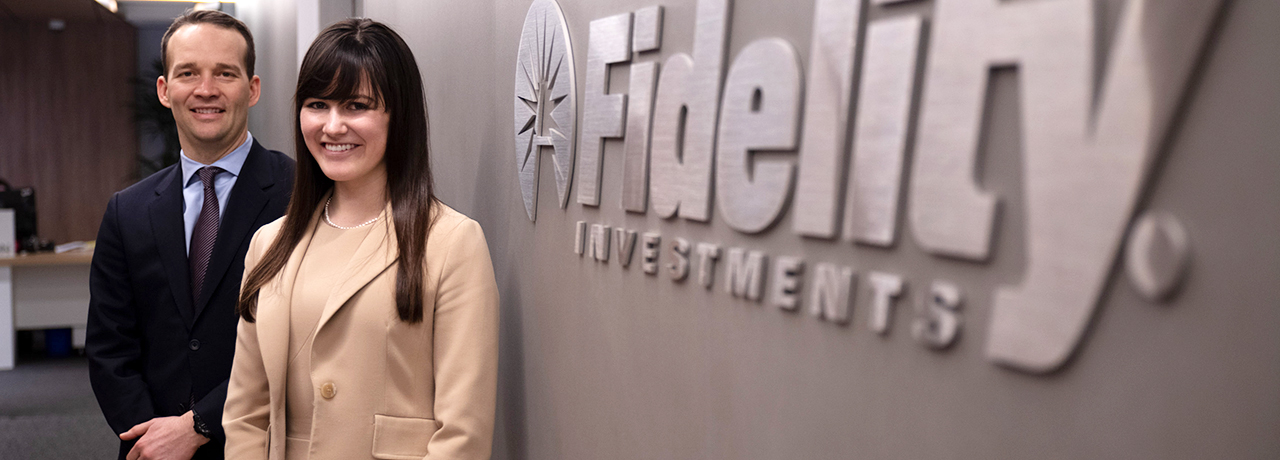
By the time Claire Fleming arrived at Fidelity Investments Canada as a fourth-year business administration co-op student, she had already completed two prior placements at a Toronto-based investing firm. She had also spent a year and a half with the Laurier Student Investment Fund, where she worked as part of a student team that managed a $900,000 stock portfolio.
Under the oversight of Joe Overdevest, a Laurier alumnus (BBA '02) and co-director of research at Fidelity, Fleming was put in charge of creating financial forecasts and recommendations for seven stocks - the same responsibilities as her full-time, permanent colleagues, only on a slightly smaller scale. The hands-on experience Fleming gained at Laurier, coupled with her exceptional academic achievements, made her a perfect match for the role.
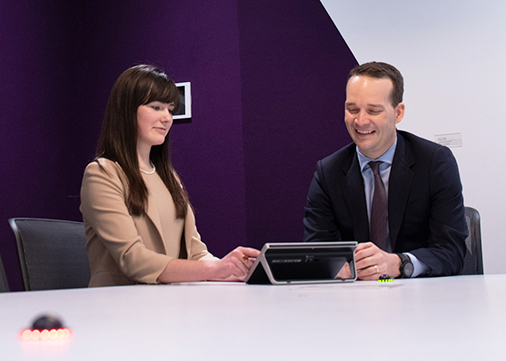
"Interns are given a lot of autonomy and responsibility very early on," says Fleming, who was hired as a full-time analyst with Fidelity following the completion of her co-op placement in 2017. "I'm now responsible for coming up with recommendations for 25 stocks. I have more responsibility, but I am doing the same type of work and working with the same people as I did during my co-op placement."
Laurier's focus on bringing together academics and real-world experiential learning opportunities makes students and graduates especially attractive to firms like Fidelity, which hires more alumni from Laurier than any other school.
"Laurier students stick out in an amazing way in terms of their experience and knowledge of the investing field," says Overdevest. "The teaching is very strong, the co-op program is exceptional and the Laurier Student Investment Fund is one of the best investment team experiences for students in Canada."
Laurier's business degree co-op program, the largest in Canada, is just one of hundreds of experiential learning opportunities available to students across a range of disciplines. Each of the opportunities are a part of Laurier's overall strategy to prepare students for careers after university through intentionally designed course curriculum and the purposeful integration of curricular and co-curricular activities. The strategy has proven successful, with Maclean's magazine consistently ranking Laurier one of the top post-secondary institutions in Canada for experiential learning.
– David McMurray
"At Laurier, experiential learning and career development is firmly secured in the university's identity, as well as in the unique experiences of its students and the legacy of its graduates," says David McMurray, vice-president of Student Affairs. "This holistic approach affirms our commitment to deliver an enriching and engaging academic and personal learning experience."
Local, national and international opportunities made available to Laurier students have included working alongside social workers in China, Uganda and Tanzania, travelling to Mexico to learn first-hand about migration and collaborating with community organizations and governments to tackle pressing problems. Students also conduct research alongside faculty members, run clubs and associations, join workplace teams as part of class projects and even start their own businesses and social ventures. Laurier also offers themed residences, where students with a common interest, major or coursework are granted extra opportunities to deepen their learning and development. The opportunities don't just lead to employment opportunities, but help students choose which career path is right for them and ensure they are ready to face whatever the real world sends their way.
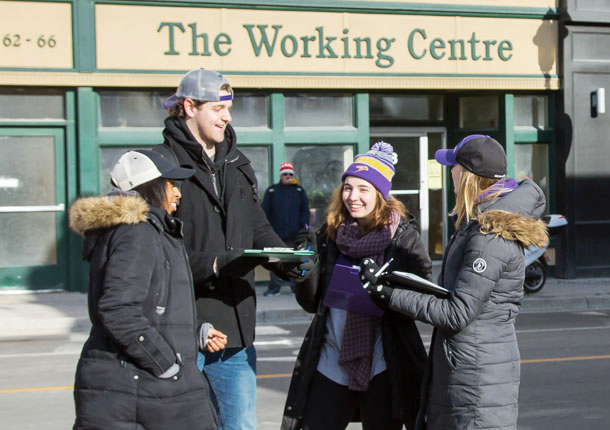
Students enrolled in Laurier's Community Engagement Option have the opportunity to deepen their learning by working with local organizations on community projects.
In their third year, Community Engagement Option students spend six hours each week at The Working Centre in downtown Kitchener, contributing to more than 30 projects including a community kitchen and digital media arts hub and supporting residents seeking employment and affordable housing.
Laurier's Community Engagement Option, like its Social Entrepreneurship Option, is run through C3 Innovation Labs, the Faculty of Arts' hub of social innovation and community-engaged experiential learning opportunities.
"I have not seen another course or program that is as transformational for students' goals as the Community Engagement Option," says Edmund Pries, assistant professor of Global Studies and Religion and Culture at Laurier and director of C3 Innovation Labs. "Alumni come back and tell us how this particular experience changed the direction of their life."
For her placement, Perri Termine, a fourth-year Global Studies major, worked with mature students facing barriers to education in a peer tutoring and support capacity as part of the Access to University program, a partnership between Laurier and The Working Centre.
"Experiential learning, but especially experiential learning grounded in the community, is the best way to prepare for life after university," says Termine. "I think sometimes students feel lost when they're stuck in books or in the bubble of campus. Having that basis of knowledge from literature is extremely important, but when you're able to apply that, to put it into practice, you can start to see where you fit and how you can contribute."
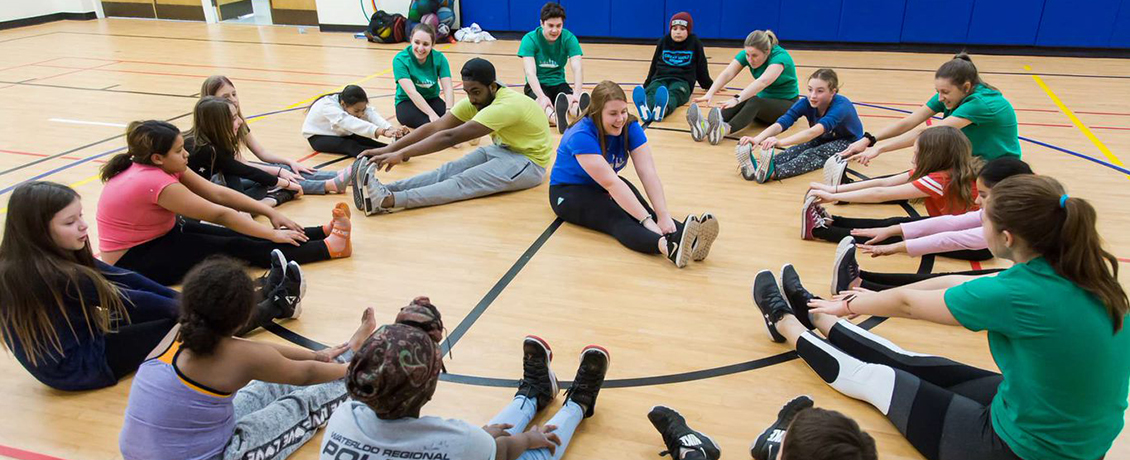
Kinesiology and Physical Education students work with Kitchener-Waterloo youth as part of the Sun Life Financial Centre for Physically Active Communities.
Undergraduate students in Laurier's Kinesiology and Physical Education program must complete 96 hours of leadership experience in the field in order to graduate. One of the most popular ways students earn those hours is through volunteering with the Sun Life Financial Centre for Physically Active Communities, a community outreach program founded in 2016 to improve activity levels for children and youth in high-priority neighbourhoods in Waterloo Region. The centre aims to break down barriers to physical activity for children, with its programs offered free of charge at local schools or nearby facilities.
- Andrew Satyanand
Laurier students are involved in all aspects of planning and implementing age-based activities, from skill-building and strength-building exercises to sports and games. Third-year and fourth-year students plan and oversee activities while first-year and second-year students work closely with individual children.
Andrew Satyanand, a fourth-year Kinesiology student, has been involved in every program offered by the Sun Life Financial Centre for Physically Active Communities. He started as a volunteer during his second year and now works as a paid leader with the centre.
"You're leading students, you're making connections and you're bringing everything you've learned inside and outside of the classroom to this setting," says Satyanand. "Seeing the impact you can make in these students' lives is really cool because they are genuinely happy to see you every time. They know they're not only going to get physical activity, but they have an older friend."
The program has not only shown Satyanand that a career in teaching is right for him, it has also provided invaluable experience for his resume. "I'm originally from the GTA and it's very hard to find experiences like this in the Toronto area because it's so saturated," says Satyanand. "At Laurier, these opportunities are readily available and that experience separates us from the pack."
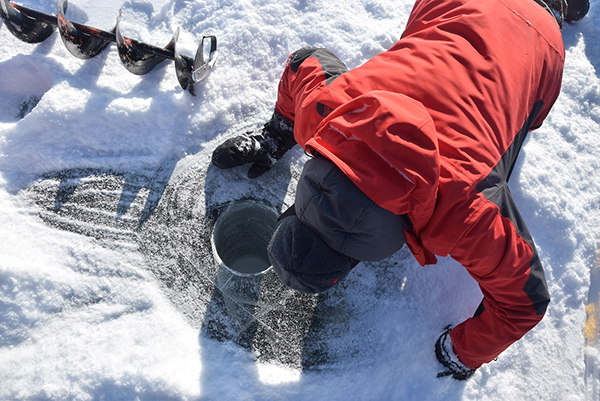
Laurier students are getting real-world experience conducting research in Canada's North.
Students also play an important role in research activities that happen at Laurier, both supporting professors' research and performing their own. Research across disciplines takes students into labs, into the community and around the world.
Each summer, Andrew Spring, adjunct professor in Geography and Environmental Studies, takes several master's students to Kakisa and Deline, two remote Indigenous communities in the Northwest Territories. There, students study the communities' food systems, including how climate change is affecting access to traditional foods and health.
Working with local communities is fundamental to Laurier's research activities in the Northwest Territories. During the summer before their programs start, graduate students live in the Northwest Territories, learning about the communities where they will conduct research, as well as building relationships with local residents.
"The research we're doing affects communities and we want to make sure that what we research will have a positive impact," says Michelle Malandra, a second-year master's student who has spent two summers in Kakisa. "Having those relationships before I started my research ensured that I chose a project that was in line with what the community wanted."
In the Department of Archaeology and Heritage Studies, Professor John Triggs is researching the oldest British fort in Ontario, buried under a parking lot at the Old Fort Erie National Historic Site at the head of the Niagara River. The fort was built in 1764 and demolished when the new Fort Erie, the one still standing today, was built in 1805. Triggs has been excavating the site and analyzing finds with the help of 20 undergraduate students a year since 2012.
Students don't just learn how to excavate, they also learn how to map and analyze archaeological layers, clean and analyze artifacts, write reports and explain their findings to the public. These skills are invaluable for finding work after graduation, especially in the consulting industry, where current students and alumni of Laurier's Archaeology and Heritage Studies program are often hired to excavate lands slated for future development.
"Every year, employers call and ask if we have any students interested in working for them," says Triggs. "Laurier students have a head start over students who don't have the same extensive experience and training. They're really sought after."
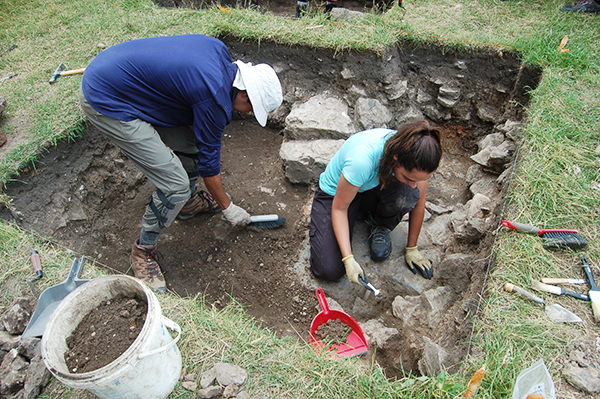
Laurier is the only school in Canada that makes taking part in a real-world excavation mandatory for archaeology students. Students have the option of spending six weeks during the summer digging at Old Fort Erie, an historic Wendat (Huron) village in Penetanguishene, Ont., projects in Greece, or the Town of Nebo Archaeological Project in Jordan.
Students can keep track of their experiences through Laurier's Experience Record, the first of its kind in Canada. The record notes experiential learning opportunities undertaken, involvement in student clubs and associations, volunteerism in the community, work as a research or teaching assistant and other activities undertaken while at university. Students can use the record to their advantage when applying for employment or further education.
"The Laurier Experience Record captures the engagement of our students in experiential learning opportunities both within the classroom and through all of their activities," says Jan Basso, associate vice-president of Experiential Learning and Career Development. "This is a foundational tool for students that illustrates the diversity of experience they gain at Laurier, contributes to their career development and helps in the successful transition from post-secondary education to the future."